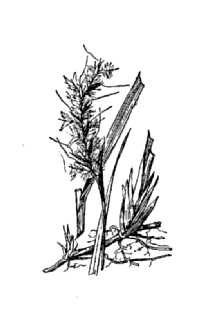Schizachyrium stoloniferum Nash
Scientific Name: Schizachyrium stoloniferum Nash

| General Information | |
|---|---|
| Usda Symbol | SCST2 |
| Group | Monocot |
| Life Cycle | Perennial |
| Growth Habits | Graminoid |
| Native Locations | SCST2 |
Plant Guide
Use soil moisture sensors to measure the soil moisture of Schizachyrium stoloniferum Nash.
Fact Sheet
Alternate Names
creeping bluestem, Andropogon stolonifer , Use soil moisture sensors to measure the soil moisture of Schizachyrium stoloniferum Nash.
Uses
Livestock readily grazes creeping bluestem throughout the year. It retains its nutritive value and stays green during the winter.
Status
Please consult the PLANTS Web site and your State Department of Natural Resources for this plant’s current status, such as, state noxious status, and wetland indicator values.
Description
Grass Family (Poaceae). Creeping bluestem is a native, warm-season, rhizomatous perennial grass. The height is between 2 and 6 feet. The leaf blade is 1/4 to 3/8 inch wide; often 2 feet long with v-shaped or flat; abruptly tapered at tip. The leaf sheath is strongly flattened; often light purplish at base; upper parts of sheath, collar, and lower part of blade very hairy. The stem is solitary or few. The seedhead is several racemes, each 1 to 1-1/2 inches long, droop slightly at maturity; seedheads are commonly 1 to 2 feet long. Distribution: For current distribution, please consult the Plant Profile page for this species on the PLANTS Web site.
Management
Where double chopping with heavy rolling cutters has controlled saw palmetto (Serenoa repens), creeping bluestem is one of the first plants to become re-established if grazing is deferred 6 to 8 months following the treatment. Plants are weakened if more than 50 to 60 percent of the current year's growth by weight is removed by grazing.
Establishment
Rhizomes grow actively in December and January, 12 to 14 inches in a single season. New leaf growth starts in January and February. Leaves stay green as long as 17 months. Basal leaves are usually only 4 inches long in 4 to 5 weeks. Creeping bluestem forms dense colonies and grows best in open areas, but tolerates 25- to 30-percent shade. Pure stands yield about 2 tons of air-dry forage per acre. Seed production is uncertain and erratic. It grows on a wide variety of soils in the sandhills and flatwoods. Cultivars, Improved and Selected Materials (and area of origin) Please contact your local NRCS Field Office.
